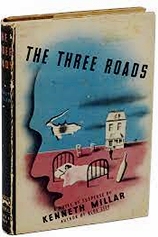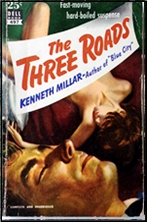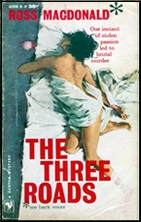Thu 22 Sep 2022
A Mystery Review by Tony Baer: KENNETH MILLAR – The Three Roads.
Posted by Steve under Reviews[10] Comments

KENNETH MILLAR – The Three Roads. Alfred A. Knopf, hardcover, 1948. Also published as by Ross Macdonald: Bantam, paperback, 1960. Many other reprint editions exist. Film: As Double Negative (Quadrant, 1980).
Lieutenant Bret Taylor returns from WWII, but his memory is shot to pieces. He is physically unscathed; he doesn’t have a traumatic brain injury. But for some reason he can’t remember a damn thing.
The psychiatrists feel like it’s some kind of guilt complex. His carrier was sunk at Pearl Harbor, and he feels responsible for the ship and the men that were lost. His mother apparently died when he was four years old, and he blames himself for it. And when he came back home from the war, he walked into his house only to find his young wife murdered: assailant unknown.
He leaves the VA psychiatric facility against physician advice to track down the murderer. He feels that if only he can solve his wife’s murder, his memories will come back to him, and he can finally live again. But be careful what you wish for.

It’s a pretty good idea for a story. But the book really freaking sucks. It’s got to be one of the worst novels I’ve ever read. I hated it.
Why, you ask?
First of all, the thing is terribly overwritten. He even has a character make a denigrating comment about Hemingway’s style — so it’s clear that the verbosity is actually on purpose. He even has the temerity to wink at the reader at one point behind a character’s back saying: “He didn’t know what irony was, but it was irony he was enjoying.” What the hell? You don’t need to be an English lit PhD like Millar to enjoy irony. You don’t even have to know the word. If the character was enjoying the irony he was enjoying the irony. I can die of arsenic even if I don’t know the word arsenic. But let’s all have a little laugh at the expense of the uneducated here folks.
Secondly, the thing is completely devoted to Freud. Seriously. The title comes from the book’s epigram, and has nothing to do with the story other than some implied Oedipus complex that Bret Taylor is allegedly working through: “For now am I discovered vile, and of the vile. O ye three roads, and thou concealed dell, and oaken copse, and narrow outlet of three ways, which drank my own blood….”–SOPHOCLES, Oedipus Tyrannus. If I were smart I would have stopped there. But hey. Who said I was smart?

Here’s an example of the horribly overwritten Freudian tripe you’ll be force fed should you choose to treat yourself to this crap:
“‘I have sometimes thought that we of the Viennese school have paid too little attention to problems of moral guilt. Freud himself was a child of his century. He never quite outgrew the physiological laboratory and its atmosphere of materialistic determinism. It is curious, is it not, that the subtlest introspectionist since Augustine should have under-valued the moral and religious life and seen the human mind in terms of blind forces working in Newtonian space?’ ‘You’re talking like a Jungian,’ she said.”
The above quote reminded me of a bit from Woody Allen’s Love and Death:
“Don’t you know that murder carries with it a moral imperative that transcends any notion of inherent universal free will?â€
“That is incredibly jejune.â€
“Jejune?! You have the temerity to say that I’m talking to you out of jejunosity? I am one of the most june people in all of the Russias.â€
It’s enough to make you wish Mike Hammer would show up and start punching people in the nose.
Lastly, the ending is tremendously unsatisfying. The final chapter is entitled “Doomsday” and is over 100 pages. But Doomsday is an vast overstatement. No justice is served, and everyone is left feeling decidedly mediocre — especially the reader.
September 22nd, 2022 at 9:44 pm
Tony
A terrific review. Makes not reading the story a lot of fun. And I will not, but if ever a synopsis appears I’ll scan it.
September 22nd, 2022 at 10:04 pm
Tony,
Oh, God yes, it’s Millar’s every worst instinct at work as a writer, almost a parody of an academic trying to write a thriller.
Before reading this I thought he wrote as Ross Macdonald to protect his academic career. After reading this I thought maybe he was protecting Ross Macdonald from the Kenneth Millar of this book.
Unfortunately a few of these tendencies survived into the early Archer novels ( the shorts were better), and once in a while would poke their head up in the late books too. Here he seems almost embarrassed by the genre and writing in it as if apologizing in case one of his academic colleagues stumbled on the book.
I’ll take bad Hemingway any day over this.
He became a much better writer, an essential writer in my opinion, but this one is more interesting as a study of what he learned and applied to his better books than as a book itself. That Freudian theme would surface again and again in the Archer novels, but with much more subtlety and art.
I’m grateful some editor saw enough promise through this that we eventually got Archer.
Graham Greene and Eric Ambler famously kept their first novels out of print (Ambler did finally relent), but neither of them had anything near as much to hide.
Just a note, but that snide note Tony points in the book toward people below the hero’s station was one of the criticisms Chandler made of The Moving Target noting Archer was often rude to ordinary working people, something Marlowe never did.
September 23rd, 2022 at 10:00 am
I like his Lew Archer novels a lot but when I read this back in 1973 I did not like it and was disappointed.
My notes in the book also mention that I saw a film based on the novel. Deadly Companion(1981) I viewed on a VHS tape in 2013 and thought it was just ok. Starred Susan Clark and Tony Perkins.
September 23rd, 2022 at 10:27 am
Re Double Negative: Walker calling it okay is truly kind and generous, it is loaded with actors doing the best they can with material that makes no sense.
The cast includes Howard Duff, Elizabeth Shepherd, sensual and compelling in her scenes with Tony Perkins, and mentioned recently as a sidekick to Patrick McNee for an Avengers episode. The great Canadian actor Ken James, with no chance, John Candy in a bit. As for Susan Clark and Michael Sarrazin, impossible boring, together or apart.
September 23rd, 2022 at 10:35 am
According to Wikipedia: “Several cast members of the Canadian comedy show SCTV appear in this film, all playing small dramatic roles. (Director George Bloomfield had directed SCTV from 1977 through 1979, and brought the cast into the fold.) John Candy, Joe Flaherty, Eugene Levy, Catherine O’Hara (her second film), and Dave Thomas (his film debut) all have minor or bit parts”. https://en.wikipedia.org/wiki/Deadly_Companion
September 23rd, 2022 at 1:34 pm
This review is ridiculing Sophocles.
This is a disaster.
Oedipus is one of the central works of human culture.
Something is really really REALLY wrong.
Emergency lights are flashing red.
Shame Shame Shame!
September 23rd, 2022 at 2:23 pm
Michael,
I’m not ridiculing Sophocles. Oedipus Rex is an excellent story. The key word here is story.
I don’t buy that every man wants to have sex with their mother and kill their father. Sorry. That’s not Sophocles. That’s Sigmund Freud (and Jim Morrison). And I’m okay with ridiculing Freud (and Morrison) if that’s what you want to accuse me of.
And while Oedipus Rex is a great story, do you know what isn’t such a great story? “The Three Roads” by Kenneth Millar.
The idea of writing a modern version of Oedipus is fine with me. Go right ahead. But this version is terrible. Sorry.
Frankly I don’t think that Millar should’ve named the thing “The Three Roads”. Yeah it makes him look like a well-read smarty pants to Freudians. But if you’re gonna do that, can you at least have three roads in the story somewhere to justify the title? Even a metaphorical three roads? Having the only reference to the title in the epigram is meaningless and a cheap way to make a crappy novel look highbrow.
September 23rd, 2022 at 2:49 pm
Thumbs up, Tony.
September 23rd, 2022 at 5:47 pm
Anyone who liked Nothing Personal, the Donald Sutherland/Suzanne Somers romcom, will love Double Negative. Made by the very same Toronto production company! Somewhere in my files is a press release in which much is made about the latter being based on a “Ross MacDonald [sic]” novel.
September 23rd, 2022 at 9:44 pm
Well played Tony.
Sorry, but the only thing any of us attacked here was a very bad very pretentious book by a then half baked academic slumming in the field ploughing through Freud’s pretty roundly rejected and overly simplistic hypothesis that said more about Sigmund than his patients.
Even as Macdonald Millar sometimes struggled early on with the idea that, like jokes, if you have to explain a metaphor like the title of the book it didn’t work. Nothing wrong with a few inside jokes for the cognoscenti, but only if they don’t give the impression of snidely looking down on anyone who doesn’t get them.
I’ll spare myself a movie of this.
As said, Freud and Millar are the ones beating a dead horse in regard to Greek literature, not Sophocles who was talking about defying the will of the gods and not outgrowing wanting sex with mommy and murdering rival daddy. Elektra isn’t about murdering Mommy so you can have sex with Dad either, the Greeks were much more basic in their genius which is why their work survived long enough or Freud to bastardize it with his personal hangups.